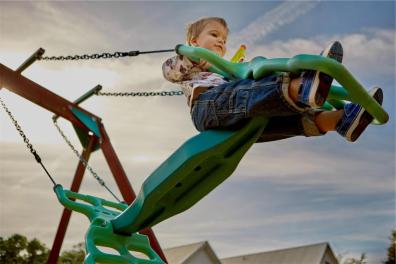When you are a Tween (aged 9 – 12) there are not very many opportunities to rebel because you are still under the watchful eye of our parents. However if you are taken to a theme park or a fairground that is an entirely different matter. Tweens are suddenly given freedom with money in their pockets and the right to roam. The more a parent tries to discourage them from going on a gravity defying increases the probability of them going on it (even if they don’t really want to). So why do children and energetic adults get a thrill from swinging about in baskets or defying the laws of gravity?
In order to answer this question we must look back at the first time we lift our feet off the ground and shriek in sheer pleasure. The simple playground swing is the first time we are elevated into the universe to experience the world around us. This article from Playdale Playgrounds explains how swings work, the physical and emotional benefits of using a playground swing. Basically swinging lets all of our senses run wild and our bodies and minds to figure out balance. The pure exertion from swinging alone improves our gross motor skills.

When looking at the principle behind roller coasters and other fairground rides the sensations we have are very much like what you experience on a swing. Basically a roller coaster involves falling through the air due to the force of gravity. During the exciting (or nauseating) ride your body and brain are being thrown about just like they were when you were a toddler, except you are much higher up and there are many more risks involved.
According to Amanda McMillan of Shape.com long queues even add to the thrill of the ride because they build up anticipation. Considering that the most popular scary rides generally have the longest queues. Tweens will probably spend at least three hours waiting to go on the rides and only minutes screaming so their act of rebellion doesn’t last very long.



